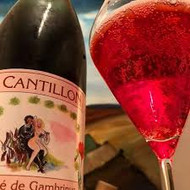A fruity beer is not always a sweet beer
Posted by Isabelle Bellet on 12th Oct 2019
Fruit beer can be spontaneous fermentation (fruity gueuze), top fermentation (fruity white beer, fruity local beer, fruity abbey beer,...) and in some rare cases, bottom fermentation (fruity pils).
For many consumers, a fruit beer is a sweet beer. And yet, according to fermentation techniques, the fruit is very often added to the must before fermentation and undergoes this fermentation, and the sugar in the fruit is transformed into alcohol, thus reducing the sugar content in the beer. A fruit beer is therefore not necessarily sweet. On the contrary, it can be very dry, like Lindemans Oude Kriek Cuvée René, or Cantillon Kriek (cherry) and Gambrinus rosé (raspberry).
The "Oude Kriek" label guarantees you a fruity cherry beer, unsweetened. The label "Oude Gueuze" or "Oude Kriek" has obtained legal protection from the European Union. Brewers are now only allowed to call their product Oude Gueuze if the old lambic used in the process has been aged for three years, matured in oak barrels and is free of any artificial sweeteners.
But some consumers want sweeter products, so manufacturers have created fruity beers with fruit flavours, containing sugar. Two movements have therefore been created: the creation of sweetened beers by mass manufacturers and the creation of fruity dry beers, in the old way, in accordance with traditions by smaller and traditional breweries.
Lovers of traditional beers want to rediscover the aromas and flavours of the beers of the past. The pleasure of drinking a tangy, dry and fruity beer.
The breweries that had bet on continuing the tradition have never had such a full order book. The Cantillon brewery must limit the quantities per customer, as demand is so much higher than supply.
On the microbrewery side, fruit beers are becoming more and more popular. There are local fruit beers, such as A Tue Tête Cerise, macerated in oak barrels with black Montreux cherries, or A Tue Tête Cassis, fermented in barrels with Valais blackcurrant, from the local Swiss brewery A Tue Tête in Aigle or La Coetus raspberry or Apricot from the Geneva brewery L'Apaisée.
In Belgium, beers brewed with fruit are generally spontaneous fermentation beers (lambic). Fermentation is caused by yeasts that are naturally found in the ambient air. This particular method gives the beer a sharp and sour taste, usually less appreciated by the uninitiated.
This base is mainly used for cherry (Kriek), raspberry, blackcurrant and even peach beers. The fruit has macerated in oak barrels where lambic is already fermenting. The sugar in the fruit then causes a new fermentation and after months of maturation, the mixture is filtered and bottled.
Kriek is the most popular style of fruity beer. Originally produced in Brussels, the brewers initially used Schaerbeek cherries, a common variety produced in the Brussels municipality of the same name, which explains the success of cherry beers in the country.
At the table, fruit beer invites itself rather well and sometimes allows magical discoveries. As a starter, fruit beers are a perfect accompaniment to shrimp, sushi, tartar and fresh herbal salads.
Feel free to make a vinaigrette based on dry fruity beer (geuze and lambic style).
Beer can be used in cooking to create excellent sauces for white meats: raspberry beer, thyme, bay leaf, shallot and a little fresh cream...
Many more hearty dishes such as fish plates, duck, chicken, goose, pork chops or ham also go well with these beers.
Cheeses, especially goat's cheese, fruit, chocolate, pastry and cheesecake, accompanied by a fruit beer, complete the whole thing perfectly.
All your summer fruits are now available in artisanal beers, so enjoy them and order them on the Beer My Guest website. (delivery throughout Switzerland in 2 or 3 days).

